- Home
- Adam Thorpe
From the Neanderthal Page 3
From the Neanderthal Read online
Page 3
that shoulders out of mud, it seems
of another order, of the order of memory –
of the like fragility and farness
as my father careering down the slope
on an evening of his boyhood
as his mother runs up in an earlier year
and another century, passing through him
to the place he’s come from and clambering there
as I did once, on a visit. And so thereafter
(when I was old enough to liken
lichen to memory), approaching
with a slower tread and the fear
that I would never really know
this place as they once did, nor lay
my ghost upon more than paper,
make no more headway than the last
hand-hold, no more impression
than this brief rearing on the lean
ridge of the keystone boulder
with its view through the oaks
of the field’s skyline and the ruined barn …
The rootless lichen marauds
inch by inch through the years,
prey only to pollution – like lemon
squeezed on an oyster’s frill
our air tests it until it dies.
I cannot remember what has changed
or whether its pattern has remained
to tease me into seeing faces
that were always there, or feel
under palms the reassuring fur
at the same heave. While the rocks
wear so well we can be sure
heirs as far from us as stars
will look upon the same
under an ageing sun
(the closest we will come to eternity),
at least there is something to guess
about lichen; whether it was,
whether it might not be there.
BALKAN TUNE
She knew a massive heap of songs,
her lullabies were ancient wrongs.
The mad were coming to their senses.
Beat the washing. Repair the fences.
Twilight came when sheep cropped faster
in her sullen neighbour’s pasture
to one now blind; and she would see
her father lying like a tree,
the flock like stones, the plane a speck
and she again too small to check
the blood that sped where he’d been strafed:
the shepherd who had stood and waved.
But what did she do to be killed?
For here she lies where she’s been spilled
by drunks in combat gear for wrongs
trickling from her throat like songs.
WINDOWS
In every job I did
there was always a soldier, ex-
but still short-haired, and trembling
with a great violence.
Up at the truck-yard, for instance,
where I was re-puttying the windows
he’d stride across
from the body shop and shout at me
Gerron you fucker as I was wet-
thumbing the paste on;
I’d grin aimlessly, loosening the flakes of paint
from mouth and eyebrows as he
slammed the pressure-hose
to clean a juggernaut, water howling
at the hub-caps, riddling the grille.
Later on, when I had
reached the paint stage, carefully sweeping
leagues of deep blue on the frames I’d filled
of the yard’s windows, he’d
come right over on one of those errands
that involve a lot of clanking
in a bag of tools,
and after the usual Lookin at me fucker?
or Wot’s the game then, la-di-da?
or You couldn’t paint
to save your fuckin balls, he
softened, slowly, and when I asked him
(running my brush along
the hardened putty at the pane’s cliff-edge)
where he’d been in the Army
he paused, then stopped what-
ever he was doing and stood by the ladder
and he talked. I’m not quite sure
whether to believe him
on reflection, but then and there,
as the winter darkened in the glass
towards the day’s end, and desperate
engines were revved in the distance
and the stink of diesel drifted like fog,
he nodded at what he said: Three
fuckin years in Northern Ireland, sleepin
in the backs of fuckin trucks …
Let me tell yer, when
it’s said that a Paddy’s fuckin blowed
hisself up, it’s lies
more ’n likely: you know
what they do? Fuckin saw it, too.
We found one bastard with his Ford Cortina
stuffed full. I watched it as they
booted him black, then cut off his tool. Tied him
to the gelly in the back of the motor
and ran for fuckin cover.
Arms ’n’ legs blown high as the sky, along with the tool.
Don’t leave no fuckin evidence, see.
An engine chugged beyond
the gaffer’s shed. The sign said R. E. Bates – who liked
to join us in the tea-break, talking horses,
the progress of his vegetables,
while I’d plough through my Patrick White. The ex-regular
stared at my brush as I eased its load
along the critical line.
I tutted, amazed, and said I found it incredible,
the blue welling up too thick
at the corner, too full
on the brush, nowhere to go but the glass
of the machine shop, smeared. He left me
to my clumsiness, my dread
that Old Man Bates would find me like this, mopping up
as best I could: it was his yard.
In a few years’ time
every blue-eyed shop and shed I’d done
with such skills as care alone could muster
would be bulldozed, after the site was sold.
FOOTPRINTS
for Sacha
We’re walking over the highest hills of France,
my son on my shoulders, and he’s on to footprints now,
the prints of boots and dogs in the path’s slough
between the stunted pines and heather and flung grass.
He wants to know where ours are. ‘Ours are behind.’
‘Why aren’t our footprints there in front?’ ‘Because
we’re not there yet. Footprints come out from us.’
‘Footprints aren’t ever where you haven’t been’d?’
‘No.’ My wife carries our seven-week-old daughter
in a sling. He wants to see his sister make some.
‘She’s much too young.’ ‘She’ll make them soon!’ ‘You’re aching
my shoulders – make some now instead of later.’
He says ‘Oh yes’ and I let him down. He runs
ahead, then turns and looks. Beyond is already
what has and has not been: the light fading,
the wind that over the hill-tops sweeps this rain.
ON THE BEACH
The sun is warm, October slants
across molten cobalt’s hiss and sheen,
gilding the knuckles of foam around the knees
of my children: what are our gods, in the end, but these
few moments in a life when we’re at ease
with it all, conscious that we’re being taken for a ride
but helpless to mind between the bull’s horns?
THE EXECUTION
What was I to look for in this land of persecution and reprisal … ?
R.L. Stevenson, Travels with a Donkey in the Cévennes
No doubt he’d walk it in stout shoes, two minutes
to muster thought and clear his throat, pause
perhaps to admire God’s handiwork of vines
then enter and fiddle with the candles as always
in a sober dark, in those constant vestry odours
shared with the tallest cathedrals of the North …
mouldy cloth, the cluttered simulacra
of God’s presence collecting dust. No doubt
he’d have listened to the river still chuckling past
to the far weir’s hiss and groped for some metaphor –
perhaps the mill-wheel’s drench downstream, that flood.
A poorish man, he’d have found some consolation
in the loveliness of place, would have heard
the first boots scrape the slabs between
peasant mutters with more love than rancour.
So, no doubt, when the Camisards came, this good
Catholic was brave: yanked from his wine,
shoved against the wall, all he’s bequeathed
us is a flurry of nicks to be fingered for
long after the flintlocks cleared from their puffs
(a thing he never saw), along with the loathing
that steadied them. Yet, putting our door to
and taking, as he did, the same two minutes
to gaze on cirrus past a roof of ilex
bursting out of walls in a place now common
(the rain only hallowing the mysteries of briar
I high-step through to where the altar stood),
it’s doubtless too easy to assume the worst,
the nave shrilled like this with cicada
and the river chuckling as it chuckled then:
that none of this missed him, or could even grace
what case-shot made of him, blurring our wall.
THE EXCHANGE
(Durchausen, Germany)
We pass a wayside crucifix and Anna
(four and a half) asks, ‘Why that man, he fall
in the water?’ ‘Which man?’ ‘That man.’
She’s pointing at the rood. I’m tempted to pass.
I look for water, see only withered flowers
but yards off as we are there might well be
a basin, closer. This intrigues me. ‘Jesus,’
I say, ‘that’s Jesus. There isn’t any water.’
She’s brewing up a storm: ‘Why – he –
fall – in?’ The tortoise slowness of adults. We go
over; the jar of blooms is wilted, there is
no water. Jesus hangs in copper, unpainted
on a cream cross beneath the apple’s boughs
laden with fruit. I say again there is no water.
She stamps her foot and tries a different tack:
‘Well why they hung him up to dry, then?’
My collapse into laughter annoys her, and so I find
I’m suddenly describing the nails, the pain,
what it was all supposed to be for. She looks
at the dappled ground, the cows in the field, and then
at Him, still as bedraggled. She doesn’t say
a word. I’ve changed the pegs to nails, and frankly
I’d prefer her version any day.
Walking to the recreation ground, she keeps
her silence. It is as if she’s letting it in –
the knowledge of this odd world where men do do
such things then put them on display, like teddies
dangling from washing-lines, not smelling nice
but hung to make them sad. Meanwhile I’m giggling
within, rinsed clean, the world made mad in the right way.
LOOK
Only the eye’s lens does not age. Old as us,
it holds out gamely, gazing into time
as the rest remakes around it: skin,
nails, hair – every cell of their grounding,
every glistening hidden interior thing
repairing itself, rewiring to newness,
suckling on the protein of its own thrust
so nothing remains as it was for long
except the lens, the gaze of the iris,
the least impermanent thing about us,
subduing only to senescence
in the milky cataracts of my mother
the lasers seared from her, etch by etch,
delicately scouring the one part of her
unchanged from the womb, the diamond
hardness of the softest bit – the glance
of the newborn, the child, the lover;
the calm pool stormed by tears, the blusters
of growing; by those gritty mornings after bombs
when history hung to be blinked at,
the harmattan, the chlorine of the deep ends;
the salve of distress, grief’s soft curtain
over the unbearable sights, the old sufferings
or the squeezed lemons of laughter;
and I think how fitting it is that the rest
falls away, endlessly remade, while a glance
remains immaculate – Donne’s windows
of the soul, that gazed on the womb’s red light,
admitting the permanence of unplumbed depths
others dive into, or query with leads,
shafted otherwise only by a life’s daylight
or the serious dreams of the eyelid.
FROM THE NEANDERTHAL
1
In the blank spaces between words
a bird flies. I would like a marsh
where cranes alight in the way cranes do
and geese chase the dead
all the way to wherever
for my landscape this afternoon:
no people have yet been born this year.
This year, there is something to be said
for the way that curious, now extinct bird
has the sky to itself for a second.
2
Aspens thrill in the spring wind.
Our roots go down
ridiculously far
for the time of year.
For the time of year
is the aspen’s,
and even a boy
on his thirtieth month
may bend an aspen
hand over hand, not very high up.
3
Our bundles have a weight, as if
there is something about God in them,
about clouds that hover as clouds do not,
about shoulders and clouds and God.
We pant to the brim in our lungs
where all sorts of boundaries begin.
We stop. We undo our bundles and cast
clouds of our own on the boulders
with the odd tiny bone like a vole’s femur
and something that might have been well, once.
4
One day, we took a boat
and the reeds welcomed us.
Geese were hoarse but we ducked
and where the darkness started
we decided to cease
all quarrels with the sky
and sleep. Mammoths roamed
in our dreams, contented
with their lot. When we awoke
what absence of tusks crowded round us!
5
Where the high-rise gives way
to our time-span at last
one of us was slain in a wood:
woods are not where we like to call
so we left his death to itself
and made for the air. He was slain
where the wood’s ferns are large
and the sunlight courts their spores.
We don’t know where he was slain, really.
I made it up on the hoof. Woods are like that.
6
There was, indeed, an immense wrong done.
The punishment was punishment enough:
exile til
l death, a haircut to shrink from.
I saw him running along the crag one day,
and called: a big white sky
hanging by its talons from the very limit.
He shouldn’t have been running
at a time like that. He must have forgotten
the whole machinery of the seasons
as I’d forgotten him, or the wrong.
7
If I could bear our shaft of ash on my shoulders
and return the core flint to its former
unfashioned self, things might look up
for all of us, since the catastrophe.
The wind is making play with our children,
the basic premise has slipped some mooring
and we aren’t as far advanced as our ghosts.
We need to move and return to the origin.
The rumbles are the vying of our stomachs.
If I could grow a flower, it would be something.
8
Keeping pace with the snow like this,
we move so fast we might meet yours one day.
Imagine that, as the seers do, cupping their moths
or pointing to the city where the grass waves
a long farewell between this one and the next.
The next will come on the back of a grub.
It will pretend to be a fir for a while.
Among the uncountable forests of fir
there is always the one with a grudge against us,
biding its time between the snow and the snow.
9
Supposing, one of us said ten years before
where we are now, with a worrying moon,
one of us was bald all over the face
like the ghost we saw that day, in daylight.
The funerary rites: there is something anxious
about the sheer quantity of petals
we throw upon the smell. I hope
the change of climate will be taken by us all
one day at a time. There is nothing more
irritating than fashioning a drift.
10
The industry of flint work guides me back.
This morning I needed to study the plover
for my baccalaureate in things and how.
It rained soon after, deciding to be sleet.
I returned with the news that in fact
the plover’s no plunger; that its cry
belongs; that the sliding grassland below
is not necessarily in pursuit.
The plover I described is not the other plover,
though the ultimate effect is the same.
11
In all uses of the term ‘modern’,
we are always available. Our hearth is as long
as my arm. Our smoke definitely longer.

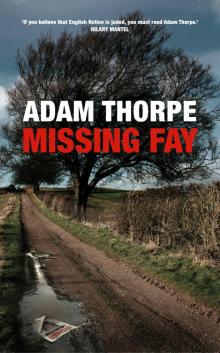 Missing Fay
Missing Fay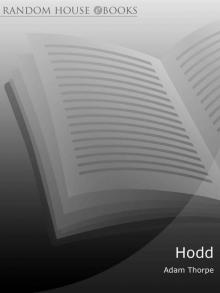 Hodd
Hodd Pieces of Light
Pieces of Light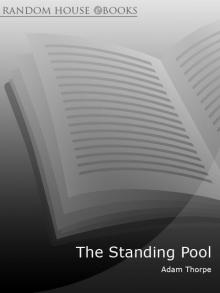 The Standing Pool
The Standing Pool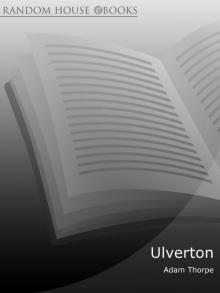 Ulverton
Ulverton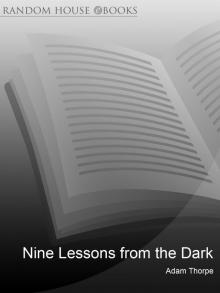 Nine Lessons From the Dark
Nine Lessons From the Dark Flight
Flight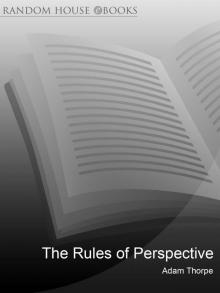 The Rules of Perspective
The Rules of Perspective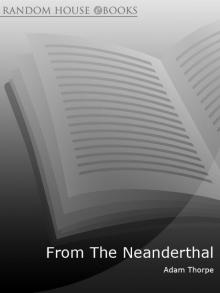 From the Neanderthal
From the Neanderthal Is This the Way You Said?
Is This the Way You Said?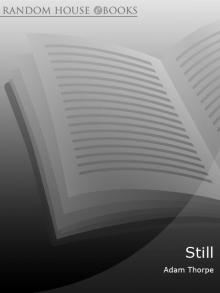 Still
Still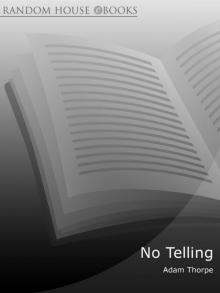 No Telling
No Telling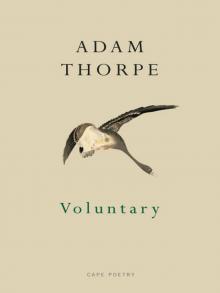 Voluntary
Voluntary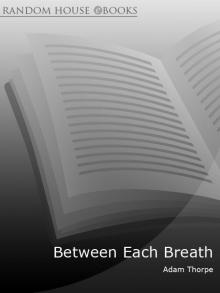 Between Each Breath
Between Each Breath